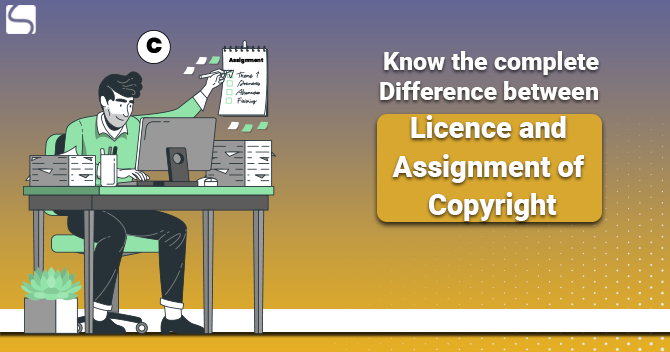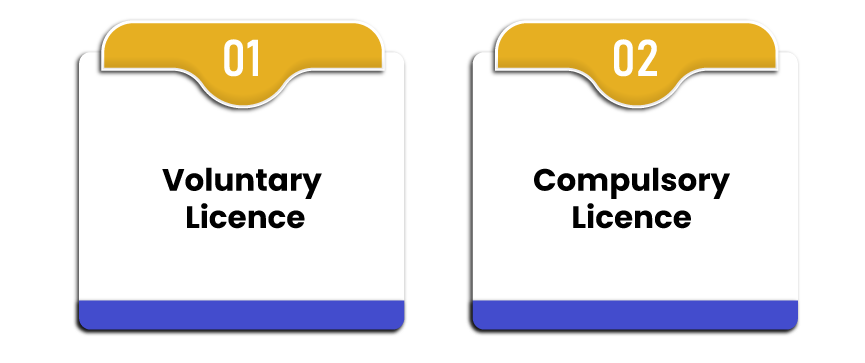Know the complete Difference between License and Assignment of Copyright

Japsanjam Kaur Wadhera | Updated: Jan 04, 2021 | Category: Copyright
A copyright is a right which gives an ownership interest in creative work and provides exclusive rights to utilize the work. The recognition of rights protects the interest of the creators. The subject matters to which copyright protection is given under Section 13 of the Copyright Act 1957[1] includes musical, literary, dramatic, cinematograph films, architectural, computer program/software, sound recording and artistic works. This article will specifically discuss about the complete difference between license and Assignment of Copyright.
Table of Contents
Assignment of Copyright
Section 18 and 19 of the Copyright Act specifically deals with the assignment of copyright. Assignment simply means the transfer of a particular right, leaving nothing in the assigner qua that particular right and granting the assignee the complete legal interest in the right so assigned. The copyright registration law consists of a bundle of rights which can be assigned completely or partially by the owner. An assignment may be general, that is, wither subject to limitation or without limitations. It may be for any part of the copyright or for the whole term of the copyright.
The assignee may be treated as the owner for the part that is assigned to him but not for any other part of the copyright which has not been assigned to him. Further, the same powers and responsibilities are forwarded to the assignee, that is, as per the agreement, once the assignee enters into it; he will have the right of adaptation, translation, printing, film making and dramatic, performing, reproducing by a mechanical device, publishing of the work.
The assignment of copyrighted work provides the pecuniary opportunity to the first owner of the copyrighted work. If the assignment of copyright is to be done in any future work, then the assignment shall come into effect only when the work comes into the existence.
It is important that the assignment of the copyright work must be done in writing and should be signed by the assignor or by an agent duly authorized by him.
The amount of royalty must be specified when the assignment of copyright work is done along with the duration of the assignment. However, if the assignment deed is silent regarding the duration, it shall be deemed to be for a period of 5 years from the date of assignment. The territorial extent must be specified of such assignment under the agreement deed. If the territorial extent is silent, then it shall be assumed to extend within India.
The assignment of copyright must be subject to the revision, extension or termination on terms mutually agreed upon by the parties. If the assignee fails to exercise his rights within one year from the date of the assignment, the assignment shall be deemed to have lapsed in respect of such right, unless otherwise specified in the assignment deed. If the assignment is contrary to the terms and conditions of the rights already assigned to a copyright society to which a creator is a member, it shall be deemed void.
Further, any dispute arising in respect to the assignment of copyright work shall be settled by the copyright board and the copyright board also has power to revoke the assignment in certain cases under section 19(A).
Licences
Section 30 – 32B of the Copyright Act deals with the licences. The term license means the consent of the owner of the copyright to do any act which is exclusive to him as the owner. It is the authorization of an act, which without such authorization would result to an infringement.
License may be non-exclusive or exclusive and may be limited in the territory, time and scope. It should be in writing and duly signed by the owner of the copyright or an agent authorized by him and it should specify particulars like:
- Duration of the License.
- Territorial extent of the license.
- Work identification.
- Terms regarding the revision, extension and termination.
- The rights licensed
- The amount of royal which is payable
What are the Types of License under Copyright?
The types of license under copyright are as follows:

Voluntary License
The voluntary license of copyrighted work comes under section 30 of the copyright act where the owner of the copyright of an existing work or a prospective owner of a future copyright work can allow or grant an interest in the right through a license.
In the cases of the copyright of the future work, the license will come in force only when the work comes into existence.
Compulsory License
The compulsory license of copyrighted work comes under section 31 of the copyright act which is withheld from the public. It gives an exclusive right to do an act without the prior permission of the owner of the copyright. The copyright owner has a right to refuse to republish or permit for the republication of the work or deny permitting the performance of the work in public due to which the work is withheld from the public.
Difference between License and Assignment of Copyright
| License | Assignment |
| Merely legalises the doing of certain things which otherwise can only be done by the copyright owner. | It is a complete transfer of ownership. |
| No proprietary right is created under License. Licensee has an individual right in the interest created, which is not assignable. | The proprietary right arises from assignments. The assignee may re-assign or deal with his interest in any way he likes. |
| A mere licensee cannot sue an infringer in his own name without joining the owner of the copyright as co-plaintiff or co-defendant. | The assignee has a legal interest in his own name, entitling such assignee or transferee to sue the infringer in his own name as an exclusive assignee. |
| There is no change of ownership with the license. It is a permission to use the copyright within limits of the license without any breach of copyright. | With an assignment, the assignee becomes the owner of the copyright, which has been assigned to him. |
Conclusion
The owner of the copyright work can generate royalty by assigning his work with the others for correlated benefits. This can be done by the way of either license or assignment. The difference between license and assignment of copyright has been explained above, and the law plays an important role to provide the rights to the copyright owner to assign or transfer these rights of ownership of copyright to the third party.
Also, Read: All you need to know about Copyright of Sound Recording














